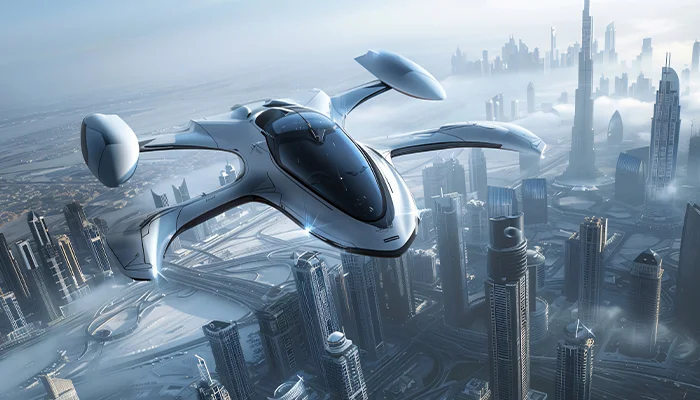
How AI is Revolutionizing the Aviation Industry in the Middle East
May 13
11:25 AM
Artificial Intelligence (AI) is changing how the world works—and the aviation industry is no exception. In the Middle East, where air travel is booming, AI is helping airports and airlines improve safety, save money, and offer better services to passengers.From smarter flight planning to virtual assistants at airports, AI is making a big impact. Let’s explore how this powerful technology is transforming aviation across the region.
The Growth of the Aviation Industry in the Middle East
The Middle East has become a global aviation hub, led by major airlines like Emirates, Qatar Airways, and Etihad Airways. With rising demand for air travel and heavy investments in airport infrastructure, the region is one of the fastest-growing aviation markets. Airports such as Dubai International (DXB) and Hamad International (DOH) are now key transit points worldwide. This growth has created the ideal setting for adopting AI to improve efficiency, safety, and competitiveness.
AI in Aviation: A Key Driver of Efficiency and Safety
The integration of AI into the aviation industry is making a significant impact on operational efficiency, safety, and decision-making processes. The Middle East's aviation sector is increasingly adopting AI to streamline operations across airports and airlines, contributing to overall growth and competitiveness.
Predictive Maintenance for Airlines: One of the most prominent applications of AI in aviation is predictive maintenance. In a region where airlines operate some of the world’s most advanced fleets, the ability to predict and prevent mechanical failures is crucial. AI systems can analyze large amounts of data from aircraft sensors and onboard systems to predict when specific parts might need maintenance or replacement. This proactive approach minimizes downtime, reduces costs associated with unscheduled repairs, and improves safety by preventing in-flight failures. Airlines in the Middle East are leading the charge in adopting AI-driven predictive maintenance to keep their fleets in optimal condition.
AI-Driven Flight Operations: AI is also revolutionizing flight operations by assisting with flight planning, air traffic management, and optimizing routes. AI tools can analyze real-time weather conditions, air traffic, and other environmental factors to suggest the most efficient routes for airlines. This leads to cost savings, reduced fuel consumption, and less carbon emissions. Airlines in the Middle East, including Qatar Airways and Emirates, have already begun integrating AI into their flight operations to optimize flight paths and reduce delays.
Enhancing Air Traffic Control with AI: Air traffic control (ATC) systems are critical for maintaining the smooth flow of air traffic in busy regions like the Middle East. Traditional air traffic management systems can be complex and prone to errors. AI is transforming ATC by enabling real-time analysis of air traffic data, improving decision-making, and enhancing situational awareness for air traffic controllers. AI can also predict traffic congestion, allowing ATC systems to manage the flow of aircraft more efficiently, minimizing delays, and improving safety.
AI and Customer Experience: Transforming Passenger Services
AI's influence is also being felt in the realm of customer experience. As air travel becomes increasingly competitive, airlines and airports in the Middle East are leveraging AI to enhance the passenger journey, making it more seamless and personalized.
Chatbots and Virtual Assistants for Personalized Service
Airlines and airports are utilizing AI-powered chatbots and virtual assistants to improve customer service. These AI systems can handle a wide range of customer queries, from flight information and baggage status to seat reservations and special requests. Virtual assistants powered by AI can provide real-time assistance to passengers at various touchpoints, whether it’s during booking, at check-in, or while waiting for a flight. With the region's rapidly growing tourism sector, this personalized, on-demand service is crucial for maintaining high customer satisfaction levels.
AI-Powered Facial Recognition for Faster Check-Ins
AI is also improving airport operations through biometric technologies like facial recognition. Middle Eastern airports, such as Dubai International, have already started implementing AI-powered facial recognition systems to streamline the check-in and boarding process. This reduces wait times, increases security, and enhances the overall travel experience by providing passengers with a quicker, frictionless journey through airport terminals. With the rise of biometric systems, the need for traditional boarding passes and manual identification checks is rapidly diminishing.
Tailored Recommendations for Passengers
In addition to customer service chatbots, AI is also being used to provide tailored recommendations for passengers. By analyzing data such as past travel preferences, purchase history, and social media activity, AI systems can recommend specific flight routes, premium services, or in-flight entertainment tailored to individual passengers. This not only improves the customer experience but also helps airlines and airports upsell products and services, increasing their revenue potential.
AI in Airport Operations: Streamlining Logistics and Security
Airports are adopting AI across various operations to improve efficiency and security. AI is making it easier to manage baggage handling, security screening, and overall terminal operations.
Better Baggage Handling: Lost or delayed baggage can ruin a trip. AI helps by tracking bags in real-time. It uses sensors and smart routing to make sure bags arrive at the right place on time.With AI, airports can also spot where delays are likely to happen and fix them quickly. This saves time and money for both travelers and airport staff.
Enhanced Airport Security: Security is a top priority for airports. AI tools help scan bags and monitor video feeds for unusual activity. These systems can flag risks faster and more accurately than humans alone.
The Future of AI in Middle Eastern Aviation
The future of AI in aviation in the Middle East is bright, with more innovations on the horizon. We can expect further integration of AI in all aspects of the aviation ecosystem, from autonomous flying vehicles to the optimization of air traffic management systems. The region’s ambitious vision of becoming a global leader in aviation technology, including the introduction of smart airports and sustainable air travel solutions, will undoubtedly rely heavily on AI.
Conclusion
AI is playing a pivotal role in shaping the future of the aviation industry in the Middle East. From enhancing operational efficiency and safety to improving customer experience and streamlining airport operations, AI is creating new opportunities and addressing the challenges that come with the rapid growth of the aviation sector in this region. As the Middle East continues to invest in AI and innovative technologies, the aviation industry here is set to become one of the most advanced and competitive in the world.










